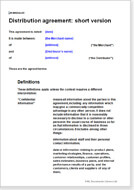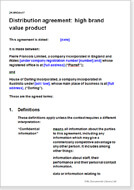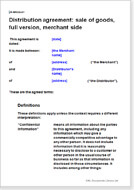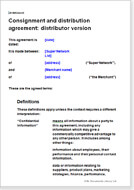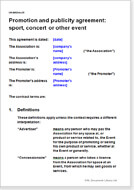“Distribution” is widely used to mean an agreement between an owner of anything and a third party who buys to re-sell it. That is a very wide range. If you are uncertain as to which of these agreements might suit you, look also at merchandising agreements and agency agreements. These agreements cover simple deals set up in New Zealand by either a seller or the distributor, through to very comprehensive deal with a foreign buyer who holds consignment stock.
Distribution agreement: short version
A practical distribution agreement whereby a merchant or manufacturer appoints a distributor who buys the goods and re-sells on his own account at home or abroad. Short version covering all basic matters but stripped of complicated options. Includes extensive drafting notes. Favours merchant but can be edited easily to favour distributor.
Distribution agreement: high brand value product
A distribution agreement, home or export, set up by a manufacturer of a product with high brand and IP value; examples: FMCG, branded consumer durable, or patent protected industrial product. Many options provide great flexibility for you to craft exactly the deal you want.
Distribution agreement: sale of goods, full version, merchant side
A practical distribution agreement whereby a merchant or manufacturer appoints a distributor who buys the goods and re-sells on his own account at home or abroad. Very full agreement with many options to suit your exact need and equally extensive drafting notes. Favours merchant but can be edited easily to favour distributor.
Consignment and distribution agreement: distributor version
A distribution agreement set up by a substantial distributor who operates a turnkey marketing business, importing goods from many manufacturers on a consignment basis. Distributor sets the rules.
Promotion and publicity agreement: sport, concert or other event
You "own" an event. This is the agreement you make with a promoter or publicist. These are your terms, not his. It covers many practical options and protects your intellectual property.

If the document isn’t right for your circumstances for any reason, just tell us and we’ll refund you in full immediately.

We avoid legal terminology unless necessary. Plain English makes our documents easy to understand, easy to edit and more likely to be accepted.

You don’t need legal knowledge to use our documents. We explain what to edit and how in the guidance notes included at the end of the document.

Email us with questions about editing your document. Use our Lawyer Assist service if you’d like our legal team to check your document will do as you intend.

Our documents comply with the latest relevant law. Our lawyers regularly review how new law affects each document in our library.
Agreements to suit many types of distribution arrangement
A “distribution agreement” could cover a wide range of possible marketing arrangements. These documents cover many angles. We include many options to cover the elements of your deal that are important to you and allow you to add any industry-related terms or special compliance you want the other side to follow.
These agreements can be used for any business selling goods of any type at home or abroad.
Favourable to one party, acceptable to both
The first point you should consider is who is setting the terms.
Each document has been drawn to favour one particular party. However, it will not help your long term relationship if you ride roughshod over your business partner. So every document takes some account of what the other side will want.
Generally, it is the producer or owner who sets the terms of what he wants from the distributor, but this can change as the distributor becomes more powerful. Our consignment and distribution agreement has been drawn for a large, modern distributor whose marketing strength and reach justify terms of which a smaller distributor can only dream.
A final contract or a basis for negotiation of heads of terms
Whether you are the distributor or the merchant, there will be many areas where you would like the other of you to do things your way. As a result there will be a lot to negotiate. By setting everything down in a document like one of these, before you start to talk, you have a head start and the agenda is yours.
Each of these is a comprehensive agreement, but as always with Net Lawman documents, you can reduce it easily to the exact terms you need.
Relevant law in these documents
The law relating to these agreements is largely common law, not statute law. That means you have great freedom to make your own deal.
If the distributor operates outside of New Zealand, there may be additional local laws with which he must comply. This document assumes that the distributor will take responsibility for all aspects of compliance with local law, whether relating to the product, the customer, importation or duties and taxes.
Particular terms covered
The documents provide the following terms.
- setting up the agreement
- obligations of each party
- compliance and regulation
- product recall
- minimum sale requirements
- distributor's marketing obligations
- distributor's liaison and reports
- the price, orders and acceptance
- delivery and transportation
- payment terms, including payment on running credit account and payment by letter of credit
- risk and retention of title
- products defective or not as ordered
- warranty and service policy
- disclaimers and limitation of liability
- mutual indemnities
- assignment and change of control of business
- confidential information
- intellectual property
- duration and termination
- warranties by one or both sides
- liaison arrangements - is there a single source of communication the parties can rely on?
- consignment stock management - if appropriate
- compliance and regulation
- fees for additional services
- stock loss and damage
- specially agreed promotions and marketing arrangements
- stock records
All rights reserved

